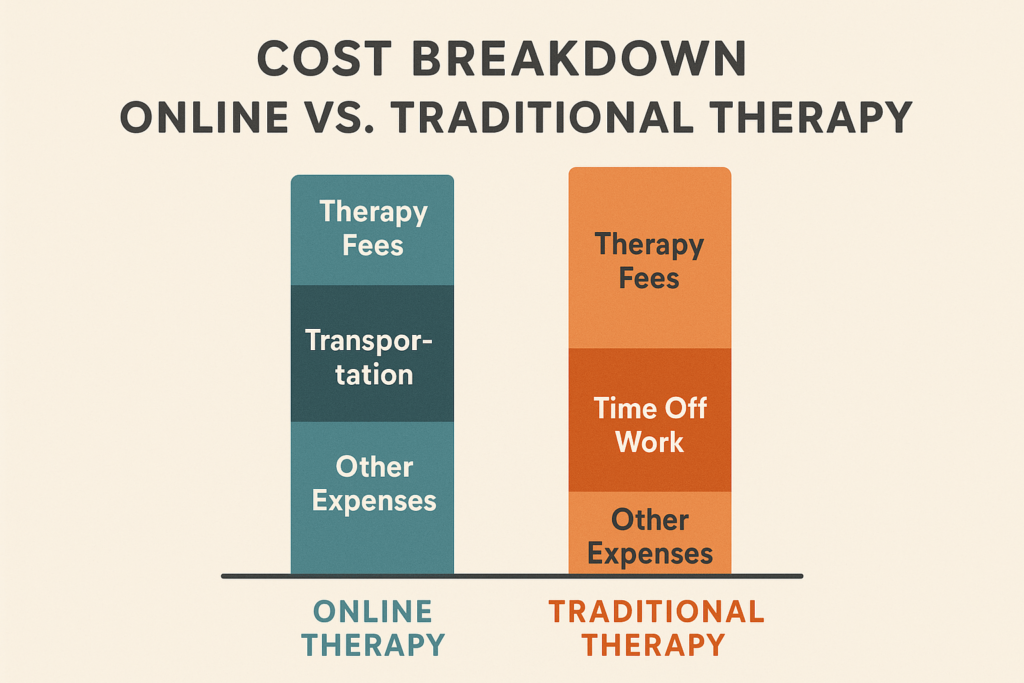Find Your Best Trauma Therapy Match in 2 Minutes
Struggling to choose between EMDR and CBT for trauma recovery? This personalized assessment helps you discover which approach might work best for your specific needs and preferences.
Over 8 million adults in the United States struggle with PTSD, yet finding qualified trauma therapy near me often feels impossible. Many trauma survivors spend months searching for the right therapist, only to face long waiting lists or providers who lack specialized training.
If you’re in Texas or Ohio and searching for local trauma treatment, you’re not alone. The right trauma therapist can make the difference between years of suffering and beginning your healing journey.

Local trauma therapy provides unique advantages over distant providers. In-person connections feel safer for many trauma survivors. Emergency support becomes accessible when you need it most. Community resources and support groups create lasting recovery networks.
Here’s what you’ll discover in this guide:
- How to find qualified trauma therapists in your Texas or Ohio community
- Different types of trauma therapy available locally
- What to expect during your first appointment
- Insurance coverage and affordable options near you
- Crisis resources and emergency support in your area
Let’s explore how local trauma treatment can help you reclaim your life from traumatic experiences.
What Is Trauma Therapy and Why Location Matters
Trauma therapy is specialized treatment that helps people heal from traumatic experiences like childhood abuse, domestic violence, accidents, or combat exposure. Unlike general counseling, trauma treatment uses specific techniques designed to process traumatic memories safely.
Location matters significantly when choosing local trauma treatment. Local therapists understand regional resources, crisis services, and community support networks available in your area.
Understanding Trauma and Its Local Impact
First, trauma affects millions of people across Texas and Ohio daily. Traumatic experiences include physical abuse, sexual assault, accidents, natural disasters, and combat exposure. These events create lasting changes in how the brain processes stress and emotions.
Childhood trauma proves particularly common, with one in four children experiencing some form of abuse or neglect. Adult survivors often struggle with depression, anxiety, relationship problems, and substance abuse without proper therapy.
Complex trauma develops from repeated traumatic experiences, especially during childhood. This requires specialized treatment approaches that address multiple trauma impacts on development and relationships.
Mental health conditions frequently co-occur with trauma, including depression, anxiety disorders, and substance abuse. Effective treatment addresses these conditions together for better outcomes.
Types of Traumatic Experiences We Treat Locally
Domestic violence survivors need specialized care that understands the unique dynamics of intimate partner abuse. Local therapists know regional resources like shelters and legal advocacy services.
Combat trauma affects many veterans in Texas and Ohio military communities. Specialized PTSD therapists understand military culture and service-related traumatic stress disorder.
Childhood trauma requires therapists trained in developmental trauma approaches. These specialists understand how early trauma affects adult relationships and mental health.
Life transitions like divorce, job loss, or serious illness can trigger trauma responses. Local therapists help process these experiences within your community context.
Why Local Trauma Therapy Matters
In-person connection feels safer for many trauma survivors than online therapy. Face-to-face interaction helps build trust essential for trauma recovery.
Crisis accessibility becomes crucial when trauma symptoms escalate. Local therapists can coordinate emergency services and provide immediate in-person support when needed.
Community resources include support groups, psychiatric services, and specialized programs that out-of-state therapists cannot easily coordinate or recommend.
Cultural understanding of regional trauma patterns helps local therapists provide more effective treatment. They understand community dynamics affecting your recovery.
Evidence-Based Trauma Therapy Approaches Available Near You
Multiple proven treatment approaches are available through qualified providers in Texas and Ohio. The best trauma therapists combine several techniques based on your specific needs and trauma history.
Cognitive Behavioral Therapy for Trauma
Cognitive behavioral therapy (CBT) helps identify and change negative thought patterns resulting from traumatic experiences. This approach works well for many types of trauma and PTSD symptoms.
Cognitive processing therapy is a specific CBT approach designed for trauma recovery. It helps process traumatic memories while challenging unhelpful beliefs about yourself and the world.
Local mental health professionals trained in trauma-focused CBT understand how to pace treatment safely. They avoid overwhelming trauma survivors while building necessary coping skills.
Therapy cognitive behavioral techniques include thought records, behavioral experiments, and gradual exposure to trauma reminders in safe environments.
Eye Movement Desensitization and Reprocessing (EMDR)
Eye movement desensitization and reprocessing (EMDR) helps process traumatic memories through bilateral stimulation. This technique reduces the emotional intensity of traumatic memories.
EMDR therapy requires specialized training and certification. When searching for local trauma treatment, verify your therapist has proper EMDR credentials and experience.
EMDR works particularly well for single-incident trauma like accidents or assaults. Many trauma therapists combine EMDR with other approaches for complex trauma cases.
Traumatic stress disorder symptoms often improve significantly with EMDR treatment. Most people see results within 6-12 sessions, though complex cases may require longer treatment.
Dialectical Behavior Therapy for Trauma Survivors
Dialectical behavior therapy (DBT) teaches emotional regulation skills essential for trauma recovery. DBT works especially well for trauma survivors with emotional instability or self-harm behaviors.
Behavioral therapy skills include distress tolerance, mindfulness, emotion regulation, and interpersonal effectiveness. These skills help manage trauma symptoms in daily life.
Local DBT programs often include both individual therapy and skills groups. This combination provides comprehensive support for trauma recovery and emotional stability.
Complex trauma survivors particularly benefit from DBT skills training. These techniques help manage overwhelming emotions without harmful coping behaviors.
Specialized Trauma Therapy Approaches
Acceptance and commitment therapy helps trauma survivors accept difficult emotions while committing to meaningful life values. This approach reduces trauma-related avoidance and isolation.
Somatic therapy addresses how trauma affects the body and nervous system. Many trauma therapy near me providers integrate body-based approaches for comprehensive healing.
Internal Family Systems therapy helps trauma survivors heal different parts of themselves affected by traumatic experiences. This approach works well for complex developmental trauma.
Trauma-informed care principles guide all effective trauma treatment, emphasizing safety, trustworthiness, collaboration, and cultural sensitivity in the therapeutic relationship.
Finding the Right Trauma Therapist Near Me in Texas & Ohio
Choosing qualified local trauma treatment requires careful research and consideration. Not all therapists have adequate training to treat trauma safely and effectively.

What to Look for in Local Trauma Therapists
Licensed credentials ensure your therapist meets state education and training requirements. In Texas and Ohio, look for Licensed Clinical Social Workers (LCSW), Licensed Professional Counselors (LPC), or Licensed Marriage and Family Therapists (LMFT).
Trauma specialization goes beyond general therapy training. Look for therapists with specific trauma therapy certifications, continuing education, and supervised experience treating trauma.
Clinical social work professionals often have extensive trauma training and understanding of community resources. Many clinical social workers specialize in trauma and PTSD treatment.
Evidence-based training in approaches like CBT, EMDR, or DBT indicates quality trauma treatment capabilities. Ask potential therapists about their specific trauma training and certifications.
Questions to Ask Potential Trauma Therapists
Training verification helps ensure competent care. Ask: “What specific training do you have in trauma therapy? Are you certified in EMDR or other trauma treatments?”
Experience assessment reveals comfort level with your trauma type. Ask: “How many trauma clients do you currently treat? Do you have experience with [your specific trauma type]?”
Treatment approach clarification helps match your preferences. Ask: “What trauma therapy approaches do you use? How do you ensure safety during trauma processing?”
Crisis support planning addresses emergency situations. Ask: “What happens if I have a crisis between sessions? Do you have after-hours support available?”
Red Flags to Avoid in Trauma Therapy
Inadequate training poses significant risks in trauma treatment. Avoid therapists without specific trauma therapy education and supervision.
Rushing trauma processing can retraumatize clients. Quality trauma therapists prioritize stabilization and safety before processing traumatic memories.
Poor boundaries indicate unprofessional practice. Quality trauma treatment requires clear, consistent boundaries to maintain safety and therapeutic effectiveness.
Lack of trauma-informed care shows insufficient understanding of trauma’s effects. Effective trauma therapists understand power dynamics, safety needs, and trauma responses.
Trauma Therapy Options in Texas: Cities and Regions Served
Texas offers numerous local trauma treatment options across major cities and rural areas. Understanding regional resources helps locate appropriate care in your specific area.
Major Texas Cities for Trauma Therapy
Houston trauma therapy resources include major medical centers, university training clinics, and specialized trauma programs. The Texas Medical Center houses several trauma treatment facilities.
Dallas-Fort Worth area provides extensive trauma treatment options, including veterans’ services, domestic violence programs, and specialized childhood trauma centers.
Austin trauma therapy includes university-based programs, community mental health centers, and private practice specialists focusing on various trauma types.
San Antonio offers military-focused trauma services given its large veteran population, plus civilian trauma treatment through hospitals and community programs.
Rural Texas Trauma Therapy Access
Online therapy helps rural Texans access specialized care when local options are limited. Many Texas-licensed therapists provide secure video sessions statewide.
Community mental health centers serve rural areas with sliding-scale trauma services. These centers often coordinate with specialists for complex trauma cases.
Traveling therapist programs bring trauma specialists to underserved rural communities on rotating schedules for intensive treatment periods.
Telehealth coverage through Texas Medicaid and private insurance makes online treatment affordable for rural residents seeking specialized care.
Specialized Texas Trauma Programs
Veterans trauma therapy programs operate through VA medical centers in Houston, Dallas, San Antonio, and other locations, providing specialized military trauma treatment.
Childhood trauma treatment centers focus on developmental trauma and family therapy. Texas Children’s Hospital and other pediatric centers offer family-based trauma programs.
Domestic violence trauma services integrate with legal advocacy and shelter programs. Many Texas cities have specialized domestic violence trauma therapy programs.
Cultural therapy addresses specific populations’ needs, including Spanish-speaking therapy services and culturally adapted trauma treatments throughout Texas.
Ohio Trauma Therapy: Finding Expert Care in Your Area
Ohio provides comprehensive local trauma treatment options through major medical centers, community programs, and specialized trauma treatment facilities across the state.

Ohio’s Major Cities for Trauma Treatment
Columbus therapy includes Ohio State University programs, Nationwide Children’s Hospital trauma services, and numerous private practice trauma specialists throughout central Ohio.
Cleveland offers trauma treatment through Cleveland Clinic, University Hospitals, and specialized programs like the Veterans Administration trauma services.
Cincinnati therapy includes Cincinnati Children’s Hospital trauma programs, University of Cincinnati medical center services, and community-based trauma treatment options.
Toledo and other regional centers provide trauma services through ProMedica health system and community mental health organizations serving northwest Ohio.
Ohio Rural and Suburban Trauma Therapy
Small town access to trauma therapy often occurs through community mental health centers and satellite offices of larger trauma treatment programs.
Community counseling centers provide sliding-scale trauma therapy services in smaller Ohio communities, often with specialists visiting on regular schedules.
Online therapy for Ohio residents expands access to trauma specialists regardless of geographic location. Many Ohio-licensed therapists offer secure video sessions statewide.
Mobile crisis services provide emergency trauma support in rural areas, connecting people with appropriate local trauma resources and crisis intervention.
Ohio-Specific Trauma Resources
State-funded programs include Ohio Department of Mental Health trauma services and grants supporting community-based trauma treatment programs.
University clinics at Ohio State, University of Cincinnati, and other institutions provide training-based trauma therapy services at reduced costs.
Ohio veterans’ services include specialized trauma programs through VA medical centers and Ohio National Guard family support programs.
Insurance coverage in Ohio includes trauma therapy benefits through Medicaid, Medicare, and most private insurance plans with mental health parity requirements.
Understanding Trauma Therapy Costs and Insurance Coverage Near Me
Trauma therapy costs vary significantly based on location, therapist credentials, and treatment intensity. Understanding financial options helps access needed care regardless of economic circumstances.

Typical Trauma Therapy Costs in Texas and Ohio
Average session rates range from $80-$150 per session for individual trauma therapy, with specialists sometimes charging higher rates for complex trauma treatment.
EMDR therapy often costs slightly more due to specialized training requirements, typically ranging from $100-$175 per session depending on location and therapist experience.
Group therapy provides more affordable options, usually costing $40-$80 per session while providing peer support alongside professional trauma therapy.
Intensive programs for severe trauma may cost $200-$500 per day but provide concentrated treatment that can reduce overall treatment duration and costs.
Insurance Coverage for Local Trauma Therapy
Major insurance plans typically cover trauma therapy under mental health benefits, with coverage similar to medical services due to mental health parity laws.
Texas insurance regulations require coverage for mental health services, including trauma therapy, though specific benefits vary by plan and provider.
Ohio insurance similarly mandates mental health coverage, with most plans covering trauma therapy sessions with standard copays and deductibles applying.
Pre-authorization may be required for intensive trauma programs or extended treatment, but routine trauma therapy sessions typically don’t require advance approval.
Affordable Trauma Therapy Options
Sliding scale programs adjust fees based on income, making trauma therapy near me accessible regardless of financial circumstances through many community providers.
Training clinics offer reduced-cost trauma therapy provided by supervised graduate students and residents under experienced trauma specialist supervision.
Community centers provide trauma services on sliding scales, often integrating with other social services and support programs for comprehensive care.
Crisis funding helps cover emergency trauma therapy costs through victim compensation programs, domestic violence services, and emergency mental health funds.
What to Expect from Local Trauma Therapy Sessions
Understanding the treatment process helps reduce anxiety about starting therapy. Quality trauma therapists prioritize your safety and comfort throughout the healing journey.

Your First Trauma Therapy Appointment
Initial assessment focuses on understanding your trauma history, current symptoms, and treatment goals without requiring detailed trauma disclosure during the first session.
Safety planning addresses immediate concerns and establishes crisis protocols. Your trauma therapist will discuss what to do if you feel overwhelmed between sessions.
Treatment goals develop collaboratively based on your needs and preferences. Effective trauma therapy respects your pace and autonomy in the healing process.
Building rapport takes priority during early sessions. Trust develops gradually in trauma therapy, and rushing this process can hinder treatment effectiveness.
Ongoing Trauma Therapy Process
Stabilization phase focuses on building coping skills and emotional regulation before processing traumatic memories. This foundation ensures safety during deeper work.
Processing work gradually addresses traumatic memories using evidence-based techniques like EMDR or cognitive processing therapy, always at your pace and comfort level.
Integration phase helps apply new insights and skills to daily life, building resilience and preventing symptom relapse as treatment progresses.
Progress monitoring occurs regularly through standardized assessments and ongoing dialogue about symptom changes and functional improvements.
Between-Session Support and Resources
Crisis hotlines provide 24/7 support when trauma symptoms escalate. Your therapist will provide specific numbers for mental health emergencies in your area.
Support groups connect you with other trauma survivors for peer support and shared experiences. Many areas have specialized groups for different trauma types.
Self-care strategies help manage trauma symptoms between sessions. Your therapist will teach specific techniques for grounding, emotional regulation, and stress management.
Local resources include domestic violence services, veterans’ organizations, and victim advocacy programs that complement your trauma therapy near me treatment.
Trauma Therapy at The Empowering Space: Your Local Solution
The Empowering Space provides specialized local trauma treatment for residents of Texas and Ohio, combining evidence-based treatments with compassionate, culturally sensitive care.

Our Approach to Local Trauma Therapy
Evidence-based treatments include cognitive behavioral therapy, EMDR, and dialectical behavior therapy delivered by licensed trauma specialists with extensive experience.
Trauma-informed care principles guide every interaction, ensuring safety, trustworthiness, and collaboration throughout your treatment journey.
Millennial-focused understanding addresses unique trauma experiences facing young adults, including social media trauma, economic stress, and delayed life milestones.
Integrated services combine trauma therapy with individual therapy, couples counseling, and other mental health services for comprehensive care.
Serving Texas and Ohio Communities
Licensed therapists in both states ensure compliance with local regulations while providing consistent, quality trauma care across our service areas.
Local resource knowledge helps connect you with community supports, crisis services, and specialized programs available in your specific region.
Emergency protocols coordinate with local crisis services and emergency departments to ensure appropriate care during mental health emergencies.
Community partnerships with domestic violence agencies, veterans’ services, and victim advocacy organizations enhance your support network.
Accessibility and Convenience
Online therapy provides secure, HIPAA-compliant video sessions for clients preferring remote care or unable to attend in-person appointments.
Flexible scheduling includes evening and weekend appointments to accommodate work schedules and other life responsibilities.
Affordable options start at $35 per week for trauma therapy with supervised therapists, making professional care accessible regardless of financial circumstances.
Insurance acceptance includes most major plans, and our team helps navigate coverage options to minimize out-of-pocket costs for trauma treatment.
Getting Started with Local Trauma Therapy
Consultations help determine if our trauma therapy services match your needs and preferences before committing to treatment.
Same-week availability ensures prompt access to trauma care when you’re ready to begin healing from traumatic experiences.
Comprehensive assessment evaluates your trauma history, current symptoms, and treatment goals to develop personalized care plans.
Crisis support provides emergency assistance and coordinates with local resources during difficult periods in your recovery journey.
Success Stories: Local Trauma Recovery Journeys
Trauma therapy near me produces real, lasting improvements in people’s lives when provided by qualified specialists using evidence-based approaches.

Real Outcomes from Local Trauma Therapy
Symptom reduction typically occurs within 3-6 months of consistent trauma therapy, with many people experiencing significant improvement in PTSD symptoms and daily functioning.
Relationship improvements develop as trauma therapy helps heal attachment wounds and communication patterns affected by traumatic experiences.
Quality of life enhancements include better sleep, reduced anxiety, improved work performance, and increased enjoyment of activities and relationships.
Long-term stability results from developing healthy coping skills, processing traumatic memories, and building resilience through professional treatment.
Common Challenges in Trauma Recovery
Initial resistance often occurs as protective mechanisms resist change. Quality trauma therapists understand this resistance and work patiently to build trust.
Emotional intensity increases temporarily as trauma processing begins. This is normal and indicates that healing is occurring under professional guidance.
Relationship changes may occur as trauma recovery affects how you interact with family and friends. Professional treatment helps navigate these transitions.
Symptom fluctuation is normal during trauma recovery. Progress isn’t always linear, and setbacks don’t indicate treatment failure.
Building Resilience Through Local Support
Community connections strengthen through participation in local support groups, volunteer activities, and trauma survivor advocacy organizations.
Healthy relationships develop as trauma therapy heals attachment patterns and improves communication skills essential for meaningful connections.
Personal growth emerges from trauma recovery, often including increased empathy, resilience, and appreciation for life’s positive aspects.
Helping others becomes possible as trauma recovery progresses, with many survivors becoming advocates, mentors, or trauma therapy professionals themselves.
Frequently Asked Questions About Trauma Therapy Near Me
Finding and Choosing Therapists
How can I find trauma therapists near me?
Start by searching online directories like Psychology Today or contacting local mental health centers. Ask for referrals from your doctor or local domestic violence/victim services organizations. Verify that therapists have specific trauma training, not just general therapy credentials.
What credentials should I look for in trauma therapists?
Look for licensed mental health professionals (LCSW, LPC, LMFT) with additional trauma-specific training. Certifications in EMDR, trauma-focused CBT, or other evidence-based approaches indicate specialized competence in trauma treatment.
How do I know if a therapist specializes in trauma?
Ask directly about their trauma training, percentage of practice devoted to trauma clients, and specific approaches they use. Quality trauma therapists can clearly explain their training and treatment methods.
Can I switch therapists if it’s not a good fit?
Absolutely. Therapeutic relationships are crucial for trauma recovery, and you have every right to find a therapist who feels safe and supportive. Most trauma therapists understand this and will help facilitate transfers when needed.
Treatment Process and Expectations
What happens in therapy sessions?
Early sessions focus on safety, stabilization, and building coping skills. Later sessions may involve processing traumatic memories using techniques like EMDR or cognitive processing therapy. Your therapist will explain each step and proceed at your pace.
How long does therapy take?
Treatment length varies based on trauma complexity and individual factors. Single-incident trauma may require 6-12 sessions, while complex developmental trauma often needs 1-2 years or more of treatment.
What is involved in therapy?
Professional treatment involves learning about trauma’s effects, developing coping skills, processing traumatic memories safely, and building resilience. Treatment includes individual sessions and may incorporate group therapy or family involvement.
How much does therapy cost near me?
Costs range from $35-$150 per session depending on therapist credentials and location. The Empowering Space offers affordable options starting at $35 weekly, with insurance often covering trauma therapy under mental health benefits.
Safety and Effectiveness Concerns
Is trauma therapy safe for everyone?
Quality therapy is generally safe when provided by trained specialists. However, people in acute crisis may need stabilization before beginning trauma processing. Your therapist will assess readiness and ensure appropriate pacing.
Can trauma therapy make symptoms worse initially?
Some temporary symptom increase is normal as trauma processing begins. Quality trauma therapists prepare you for this and provide coping strategies. Severe worsening may indicate need for treatment adjustments.
How do I know if therapy is working?
Signs of progress include improved sleep, reduced nightmares, better emotional regulation, and increased ability to function in daily life. Progress isn’t always linear, so discuss concerns with your therapist regularly.
What if I’m not ready to process trauma memories?
Good trauma therapy doesn’t rush into memory processing. Initial treatment focuses on stabilization, safety, and skill-building. You control the pace of trauma processing within therapeutic recommendations.
Conclusion
Local trauma treatment offers hope and healing for survivors of traumatic experiences throughout Texas and Ohio. Professional treatment provides the specialized care needed to process trauma safely and rebuild meaningful lives.
Local trauma therapy provides unique advantages including in-person support, community connections, and access to regional resources that complement your healing journey.
The Empowering Space understands the courage required to seek trauma treatment. Our experienced team provides compassionate, evidence-based specialized care designed to help you reclaim your life from traumatic experiences.
Recovery is possible regardless of how severe your trauma or how long you’ve struggled with its effects. With qualified trauma therapy near me, you can develop the skills and support needed for lasting healing.
Ready to begin your trauma recovery journey? The Empowering Space offers consultations to help determine the best treatment approach for your needs. Take the first step toward healing – you deserve professional support that honors your courage and resilience.
Your trauma doesn’t define you, but your recovery can transform you. Contact The Empowering Space today to find qualified local trauma treatment and begin building the life you deserve.
For immediate crisis support, contact the National Suicide Prevention Lifeline at 988 or the Crisis Text Line by texting HOME to 741741.
Find Your Best Trauma Therapy Match in 2 Minutes
Struggling to choose between EMDR and CBT for trauma recovery? This personalized assessment helps you discover which approach might work best for your specific needs and preferences.






